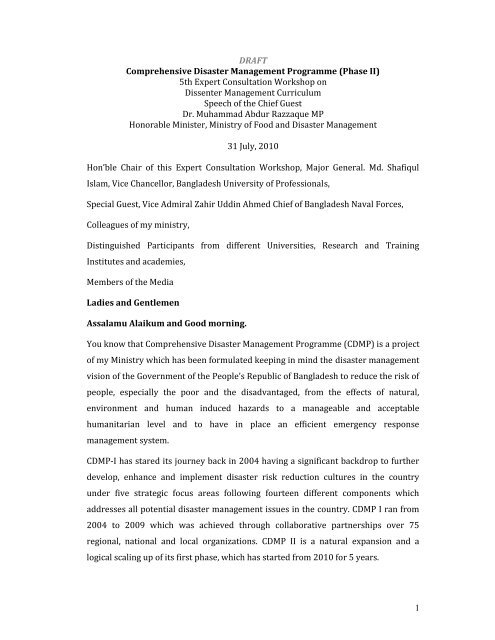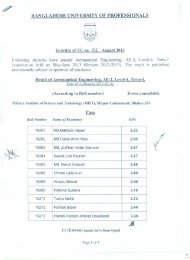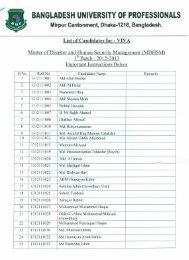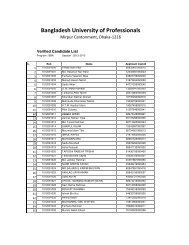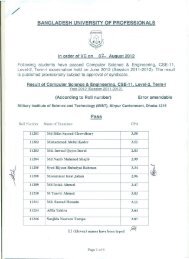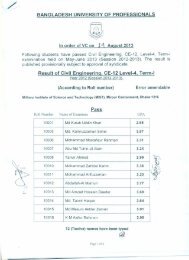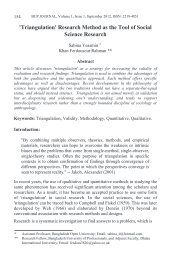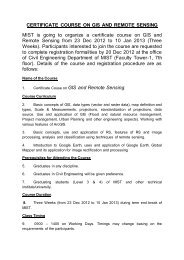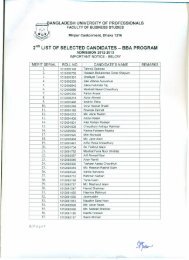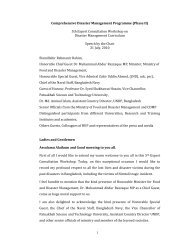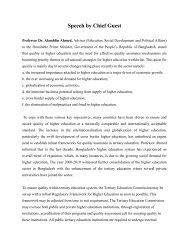Speech by Chief Guest Dr. Muhammad Abdur Razzaque, MP - BUP
Speech by Chief Guest Dr. Muhammad Abdur Razzaque, MP - BUP
Speech by Chief Guest Dr. Muhammad Abdur Razzaque, MP - BUP
- No tags were found...
You also want an ePaper? Increase the reach of your titles
YUMPU automatically turns print PDFs into web optimized ePapers that Google loves.
DRAFT<br />
Comprehensive Disaster Management Programme (Phase II)<br />
5th Expert Consultation Workshop on<br />
Dissenter Management Curriculum<br />
<strong>Speech</strong> of the <strong>Chief</strong> <strong>Guest</strong><br />
<strong>Dr</strong>. <strong>Muhammad</strong> <strong>Abdur</strong> <strong>Razzaque</strong> <strong>MP</strong><br />
Honorable Minister, Ministry of Food and Disaster Management<br />
31 July, 2010<br />
Hon’ble Chair of this Expert Consultation Workshop, Major General. Md. Shafiqul<br />
Islam, Vice Chancellor, Bangladesh University of Professionals,<br />
Special <strong>Guest</strong>, Vice Admiral Zahir Uddin Ahmed <strong>Chief</strong> of Bangladesh Naval Forces,<br />
Colleagues of my ministry,<br />
Distinguished Participants from different Universities, Research and Training<br />
Institutes and academies,<br />
Members of the Media<br />
Ladies and Gentlemen<br />
Assalamu Alaikum and Good morning.<br />
You know that Comprehensive Disaster Management Programme (CD<strong>MP</strong>) is a project<br />
of my Ministry which has been formulated keeping in mind the disaster management<br />
vision of the Government of the People’s Republic of Bangladesh to reduce the risk of<br />
people, especially the poor and the disadvantaged, from the effects of natural,<br />
environment and human induced hazards to a manageable and acceptable<br />
humanitarian level and to have in place an efficient emergency response<br />
management system.<br />
CD<strong>MP</strong>-I has stared its journey back in 2004 having a significant backdrop to further<br />
develop, enhance and implement disaster risk reduction cultures in the country<br />
under five strategic focus areas following fourteen different components which<br />
addresses all potential disaster management issues in the country. CD<strong>MP</strong> I ran from<br />
2004 to 2009 which was achieved through collaborative partnerships over 75<br />
regional, national and local organizations. CD<strong>MP</strong> II is a natural expansion and a<br />
logical scaling up of its first phase, which has started from 2010 for 5 years.<br />
1
The pioneering phase of CD<strong>MP</strong> (2004 -2009) laid the foundations for<br />
“Professionalizing and institutionalising the disaster risk reduction” approaches and<br />
frameworks developed through pilot testing and I do believe that in the last 4 Expert<br />
Consultation Workshops you have shared these issues. In the onset of this 5 th Expert<br />
Consultation Workshop of CD<strong>MP</strong> today, I welcome you everybody on behalf of the<br />
Ministry of Food and Disaster Management.<br />
Dear Professors, Researchers and Trainers,<br />
You know Bangladesh is particularly vulnerable to natural hazards and disasters,<br />
which have triggered these days, due to the impact of climate change. We have been<br />
struggling with flood, cyclone, storm surge, landslide, river erosion. It has impact in<br />
our agriculture, food security, infrastructure and almost all spheres of development<br />
initiatives. A major disaster can set back all the development work carried out past.<br />
We have experienced these in Cyclone Sidr, Flood 2007 and Cyclone Aila. Recently we<br />
have experienced about the negative effect of other hazards, like fire at Nimtoli and<br />
Landslides in Chittagong. Building collapse and latent earthquake threat, are<br />
alarming issues for the government of Bangladesh now a days, which need further<br />
attention for preparedness to large scale disaster.<br />
In all hazards identification, prevention, mitigation, risk transfer, preparedness and<br />
emergency response phases, all spheres of disaster management, role of researchers<br />
and academics, role of universities, training institutes and research institutes are<br />
very much important to a nation.<br />
I am very much happy to know that a network on “Disaster Management Education,<br />
Research and Training” has established through CD<strong>MP</strong>’s technical and financial<br />
support during its first phase, which enabled university professors, researchers and<br />
trainers to work together, share their experiences, finding solution to disasters<br />
impact. All efforts are to enhance the capacities of Bangladesh Disaster Management<br />
System. I am also happy to see the known faces in front of me, representing<br />
university of Dhaka, BUET, University of Rajshahi, Patuakhali Science and Technical<br />
University, Kulna University, Jahangirnagar university and representation from other<br />
major universities, reputable training and research institutes.<br />
I came to know that this group has already developed curriculum for<br />
2
1. Bachelor or Science in Disaster management,<br />
2. Post-Graduate Diploma in Disaster Management,<br />
3. Master of Disaster Management,<br />
4. Master of Science in Disaster Management<br />
Those have been introduced and institutionalized in the Patuakhali Science and<br />
Technology University, in the University of Dhaka and in other major universities.<br />
I was informed that pilot research projects on disaster management issues also<br />
commissioned during CD<strong>MP</strong> I, through these universities. To incorporate of disaster<br />
risk reduction and climate change in textbook through NCTB and in training course<br />
curricula though reputed training institutes like BARD, RDA, BPATC, NAEM and BCS<br />
admin academy have also made substantial progress.<br />
Further to add that, the host of this consultation workshop, Bangladesh University of<br />
Professional have also come forward on emphasizing disaster management issues <strong>by</strong><br />
introducing a 3 credit course on Disaster Management in the of BBA degree<br />
programme.<br />
I acknowledge that this technical expert group made a significant progress on the<br />
national commitment of Hyogo Framework for Action (2005 -2010) and to enhance<br />
our own capacity. On this occasion, I like to take an opportunity to congratulate you<br />
all for the effective achievements.<br />
Dear Experts,<br />
CD<strong>MP</strong> II has just began its journey, I like to declare that like CD<strong>MP</strong> I, CD<strong>MP</strong> II will also<br />
continue to do support to universities, education, research and training institutes,<br />
professional communities and networks. It will support to strengthen “Learning and<br />
Development” initiatives <strong>by</strong> up-scaling it to national, zonal to community level<br />
through establishing centers at district and community level, through development of<br />
tools and system for e-learning to support government e-governance vision through<br />
education and knowledge transferring. Through the project operational modalities<br />
we like to support you<br />
3
To produce and procure international standard but national contextual<br />
resource materials (books, learning materials) to further strengthen the<br />
academic initiatives on disaster management.<br />
To continue the research initiatives on disaster risk reduction and climate<br />
change adaptation taken <strong>by</strong> the universities and research institutes<br />
To publish journals on disaster risk reduction and climate change<br />
To develop supplementary learning materials.<br />
At the end I like to let you know that our Prime Minister approved ‘Revised version of<br />
the Standing Orders on Disaster (SOD) and National Disaster Management Plan<br />
(2010-2015)’. This will ensure effective planning for coordination of disaster risk<br />
reduction and emergency response management at all levels for all hazards. These<br />
showed our government commitment to disaster management and to ensure food<br />
security.<br />
Everybody knows that disaster management is not an individual business rather a<br />
business for all. All your efforts to support our common goals will be greatly<br />
acknowledged. I hope your full support will remain continued to our nation building<br />
process.<br />
I would like to offer my sincere thanks to the partners like UNDP, DFID, European<br />
Union, Swedish SIDA, Government of Norway and AusAid to support us in CD<strong>MP</strong>-II<br />
and also many other areas for developing for disaster resilient environment.<br />
Thanks to the organizers, especially the Bangladesh University of Professional for<br />
inviting me to this learned gathering and all the participants, representing institutes’<br />
Thank you all.<br />
Now I declare open the workshop and wish a complete success of the<br />
workshop.<br />
4


